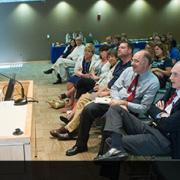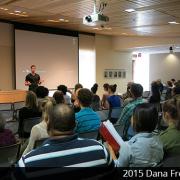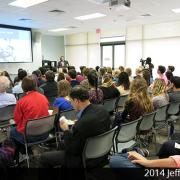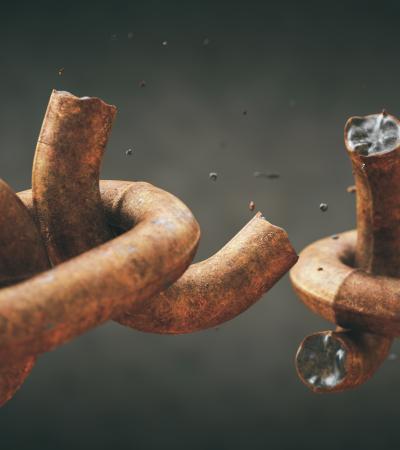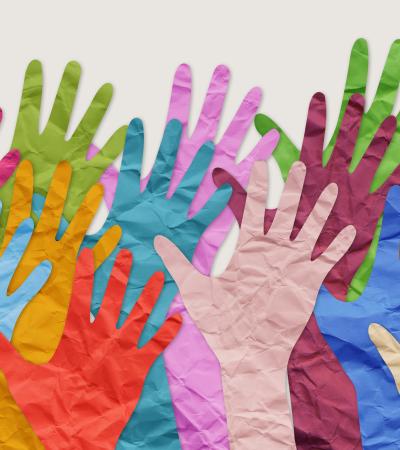The Exploring Social Justice series brings to campus exemplary leaders from diverse backgrounds who have advocated for human rights and social justice issues. The program is offered in partnership with univerity's Center for Diversity and Inclusion and the Kay Spiritual Life Center.
Advanced Planning
In 2013, the American University Library submitted a proposal to the Fetzer Institute for its support for the Exploring Social Justice series for 2014-15. The Fetzer Institute works to investigate, activate and celebrate the power of love and forgiveness as a practical force for good in today’s world. American University, heavily invested in social justice — both academically and socially — shares similar interests with the Fetzer Institute.
There were five main goals of the program: to host a series of lectures presented by prominent leaders in social justice work; to provide a platform for at least 600 students, faculty and community members to learn about the power of love and forgiveness as illustrated through social justice scenarios; to promote the series through institutional collaborations, professorial-encouraged class participation, electronic media and social media; to create discussion guides about each program, elaborating on the learning goals of the entire series and inviting interactive participation by those engaged at the series, in the classroom or on the web; and to collect feedback from the participants and project staff in order to evaluate the project and to measure the effectiveness of the learning objectives. View the subject guides for the 2014-15 series.
Planning for the 2015-16 series began in March, six months before the first scheduled event in the series. Planning started with setting a budget, followed by brainstorming about which social justice concepts we wanted to explore, and then identifying presenters and organizations in those fields. We took a broader approach to the social justice topics for this year’s events, covering issues such as food justice, civil rights and the criminal justice system.
Marketing
The series was promoted through the Washington Research Library Consortium (WRLC), a group of universities of the Washington metropolitan area, the American University website, posters and fliers, and social media outreach. Students were also reached through their professors, who themselves are active in social justice issues. Social media promotion (using the hashtag #ExploreSocialJustice) was effective. For the total series, Twitter posts were seen 29,476 times and had 367 engagements, while Facebook posts were seen 3,245 times and reached 1,328 people.
Budgeting
The series budget for the first year was $20,000, which included funding for marketing, presenter travel expenses and honoraria, and catering. The series budget for 2015-2016 was significantly less at $800. This was still covering the costs of presenter travel expenses and honoraria, catering and marketing. As a way to continue this program without grant funding, we found local speakers (eliminating the need to fund travel expenses) and offered a more modest honorarium. Cost-cutting could also be achieved by reducing or eliminating catering.
Day-of-event Activity
Event set-up includes tables for catering at the post-event reception, event chairs, a check-in table and any AV the speaker requires (Powerpoint, video, mic, etc.). The events are also video recorded for the library’s YouTube account by the University’s Academic Multimedia Services department. The spaces in which we host these events usually have building operations staff to place tables and chairs, but otherwise, set-up usually only required one or two people.
Program Execution
During the first year of the series, almost 300 people attended the events, cumulatively. There were more than 600 visits to the subject guides on the website. The feedback received for the presentations and the exhibition was all very positive. Many students, faculty and community members were able to learn about social justice, forgiveness and reconciliation, and conditions for achieving peace. Many learned first-hand about organizations with missions of peace and justice, and many learned of the passionate service rendered by dedicated people.
The objectives for the program’s first year laid out for the purposes of the grant were achieved. Five programs and an exhibition were presented for the series, which reached a broad audience. The series was promoted through the website, social media and discussion-encouraging subject guides.
The first year of the series was evaluated by an external reviewer. The project evaluation was submitted to the Fetzer Institute to demonstrate fulfillment of the grant’s requirements. The external evaluation concluded that the project accomplished all of its objectives and learning outcomes.
Advice
An important part of the planning process is allowing enough time to correspond and come to an agreement with potential presenters. The back-and-forth correspondence can take weeks or even months, especially during the summer when people are less responsive. It is also important to choose topics and issues that relate to your targeted audience. American University students, staff and faculty are heavily vested in social justice issues, so this event series resonates with our community.
Supporting Materials
- Feedback (Coming Soon!)
- Programming Librarian Facebook Group

